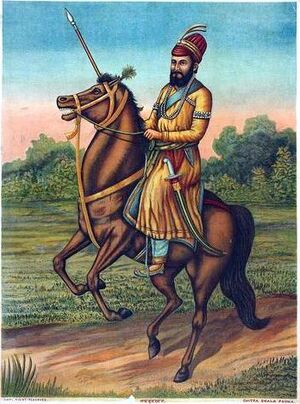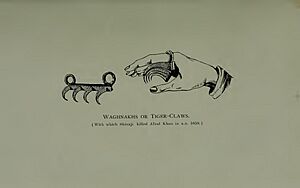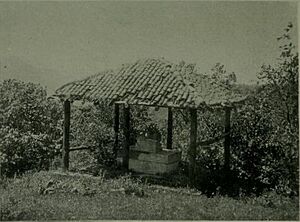Afzal Khan (general) facts for kids
Quick facts for kids
Afzal Khan
|
|
|---|---|

c. early 20th century painting
|
|
| Died | 20 November 1659 (10 November in Julian calendar) Foot of the Pratapgad fort
|
| Other names | Afzul Khan |
| Occupation | Military general |
Afzal Khan (died 20 November 1659) was a powerful general in India. He worked for the Adil Shahi dynasty of the Bijapur Sultanate. He helped Bijapur expand its control in the southern parts of India. He did this by defeating local rulers called Nayaka chiefs. These chiefs had taken over lands that used to belong to the Vijayanagara Empire.
In 1659, the Bijapur government sent Afzal Khan to fight against Chatrapati Shivaji Maharaj. Shivaji was the founder of the Maratha Empire. Afzal Khan was killed during a peace meeting with Shivaji Maharaj. His army was then defeated in the Battle of Pratapgad.
Contents
Afzal Khan's Victories in Southern India
After the Vijayanagara Empire became weaker, the Bijapur government wanted to take over its old lands. They sent armies to fight the local Nayaka chiefs. One of these chiefs was Virabhadra, the ruler of Ikkeri.
A chief named Kenge Nayaka helped Bijapur capture Ikkeri. In return, he asked for the fort of Sira. Bijapur sent Afzal Khan to capture Sira. Afzal Khan met with Sira's commander, Kasturi Ranga Nayaka, and killed him. Bijapur captured the fort and gave it to Kenge Nayaka.
Later, Kenge Nayaka rebelled against Bijapur. He gathered a large army at Basavapattana. Bijapur's army, led by Randaula Khan, attacked Basavapattana. Afzal Khan, along with other commanders, fought bravely. He entered the fort and captured its main part. Kenge Nayaka tried to fight back but was defeated. He surrendered and was later killed.
Bijapur's victory over Kenge Nayaka made other Nayaka chiefs afraid. They agreed to accept Bijapur's rule. Afzal Khan helped capture more forts and towns, expanding Bijapur's power.
Afzal Khan's Campaign Against Shivaji
Afzal Khan is most famous for his fight against Shivaji. Shivaji later founded the Maratha Empire. This campaign ended with Afzal Khan's death. It became a very important story in Marathi literature.
How the Conflict Started
Shivaji was the son of Shahaji, a general who had worked with Afzal Khan. Shivaji managed his father's lands near Pune. But he started acting on his own, taking over lands from other Bijapur rulers. He even talked with the Mughal emperor Aurangzeb.
Bijapur's government was busy with other problems. They had a Mughal invasion and internal politics. So, they couldn't deal with Shivaji right away. After making peace with the Mughals, Bijapur focused on Shivaji.
The queen mother of Bijapur likely decided to send Afzal Khan. An English letter from that time suggests she told Afzal Khan to pretend to be Shivaji's friend. She believed military force alone might not defeat Shivaji.
Afzal Khan's army had about 10,000 soldiers. Some Maratha sources say his army was much larger. But historians believe these numbers were exaggerated to make Shivaji's victory seem even greater.
Desecrating Temples
Afzal Khan was a Muslim, and Shivaji was a Hindu. Some historical texts say that Afzal Khan's army destroyed Hindu idols. They mention him destroying the idol of Bhavani, Shivaji's family goddess, in Tuljapur. They also say he harmed temples in Pandharpur. These actions might have been meant to make Shivaji leave his fort. They also angered local Hindu leaders.
However, other historical records, like letters from the English and Dutch trading companies, do not mention these temple destructions.
Afzal Khan set up his camp at Wai. Shivaji stayed in the strong Pratapgad fort. Afzal Khan's actions were likely a way to provoke Shivaji. He wanted Shivaji to come out and fight in an open battle.
Peace Talks
Afzal Khan sent his envoy, Krishna Bhaskar Kulkarni, to Shivaji. He said he was a good friend of Shivaji's father. He promised to help Shivaji get more land and recognition from Bijapur.
Shivaji's followers were worried. Afzal Khan's army was strong and had been plundering Shivaji's lands. Shivaji's advisors told him to make peace.
Some stories say that the goddess Bhavani appeared to Shivaji in a dream. She warned him about Afzal Khan's plans. Shivaji then decided to either win or die fighting. He called his armies closer to Pratapgad.
Shivaji secretly met with Afzal Khan's envoy. He asked him about Afzal Khan's true intentions. The envoy hinted that Afzal Khan had a trick planned. Shivaji then sent his own agent, Gopinath Pant, back with the envoy. Gopinath pretended that Shivaji was scared and willing to surrender. But his real goal was to learn about Afzal Khan's army and plans. Gopinath found out that Afzal Khan planned to arrest Shivaji at their meeting.
Knowing this, Shivaji pretended to be too scared to come to Wai. He suggested a meeting near Pratapgad fort, with only a few bodyguards. Afzal Khan agreed. Shivaji then prepared the area, setting up luxurious tents. He also placed his soldiers in hidden spots along the path to the meeting point.
Before the meeting, Shivaji made plans for his government. This was in case he was killed.
The Meeting and Afzal Khan's Death
Shivaji prepared himself carefully. He wore thin chain mail and iron armor under his clothes. He also hid two weapons: a bagh nakh (metal claws) and a sword. He went to the meeting with two trusted soldiers.
Afzal Khan came with many soldiers, but Shivaji's envoy convinced him to bring only two men. So, Afzal Khan arrived with five men, including his expert swordsman, Sayyid Banda. Shivaji asked for Sayyid Banda to leave the tent.
Inside the tent, Afzal Khan and Shivaji met with three men each. Accounts say Afzal Khan insulted Shivaji. Then, he tried to stab Shivaji with a hidden weapon. Shivaji's armor protected him. Shivaji fought back with his hidden weapons.
Afzal Khan rushed out of the tent. His companion, Sayyid Banda, attacked Shivaji. But Shivaji's soldier, Jiva Mahala, quickly killed Sayyid Banda. This event is remembered in a Marathi saying: "Because of Jiva, Shivaji survived."
Afzal Khan was then killed and beheaded. Different historical sources describe who killed him and how. Some say Shivaji himself killed him with a sword. Others say one of Shivaji's soldiers did it.
After Afzal Khan's death, Shivaji's hidden Maratha troops attacked the Bijapur army. They defeated them in the Battle of Pratapgad on November 20, 1659. Many of Afzal Khan's soldiers died. Two of his sons were captured. One son, Fazl Khan, escaped.
Afzal Khan's Legacy
Afzal Khan's head was shown as a trophy and buried at Pratapgad. The rest of his body was buried in Javli.
Shivaji's victory over Afzal Khan became very popular. Bards (storytellers) sang ballads about it. These stories often compared Shivaji to heroes and Afzal Khan to villains.
One legend says Afzal Khan had a premonition of his death. He supposedly killed his 63 wives before leaving for the campaign. He did this to prevent other men from marrying them after his death. Their graveyard is known as Sath Khabar.
An annual celebration was held at Afzal Khan's tomb. But in the 1990s, some Hindu groups objected. They started their own event, "Shiv Pratap Din," to celebrate Shivaji's victory. This event sometimes led to conflicts. In 2014, a ban was placed on showing paintings of Shivaji killing Afzal Khan. However, in 2022, Shiv Pratap Din was granted festival status and celebrated at Pratapgad fort.
See also
- Shaista Khan, a Mughal general whose defeat by Shivaji is similarly celebrated in Marathi literature
Images for kids
 | John T. Biggers |
 | Thomas Blackshear |
 | Mark Bradford |
 | Beverly Buchanan |






